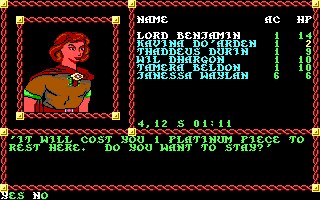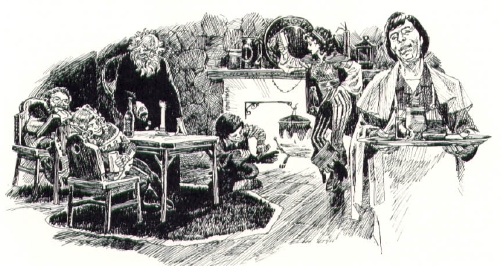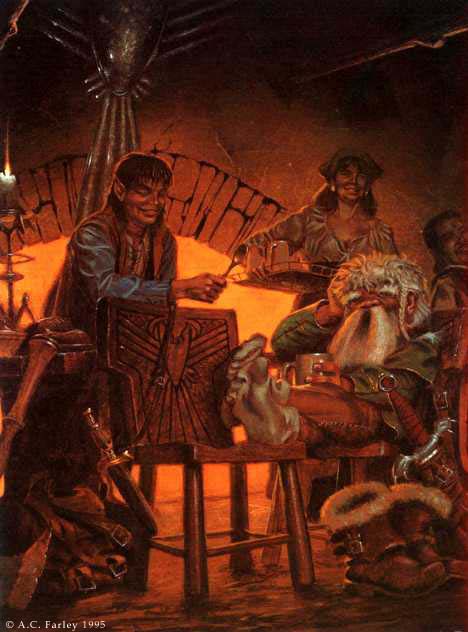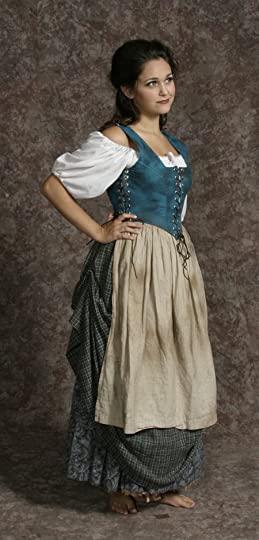by Patrick G. Goshtigian and Nick Kopsinis
| Inn ratings | Explanation of services | Tavern ratings | - | - |
| Dragon 136 | - | Inns and Taverns | - | Dragon |
In the AD&D® game world, there
are
always times when traveling adventurers
must stop and rest for the night in a city
away from home. Inns provide lodging for
the adventurers, and taverns provide
meals and an opportunity to mingle with
the local people.
All inns and taverns differ in their own
ways; each always gives adventurers a
unique setting. However, the quality of
these establishments may range from poor
to excellent. This article provides definitions
of typical inns and taverns (rated by
quality) and suggested fees for their services.
This information should not be considered
adamant, and the DM is
encouraged to expand and modify it as his
campaign commands. Judgment should
also be used as to the availability of foods
in various regions (e.g., seafood is not
available in a desert).
Some inns also have lounges and dining
facilities. These areas are usually smaller
than those of an actual tavern and are a
direct part of the inn. The majority of the
patrons in these areas are occupants of
the inn rather than local people.
One possible way to use this information
is to key the inns and taverns shown on
large city maps with an initial ("I" for inns
and "T" for taverns) and a number of stars
appropriate to the establishment?s quality.
This shorthand system would help spur-ofthe-
moment traveling in urban areas.

One-star inns *
One-star inns are typically located off
dirt roads and alleys in the seedier parts of
cities and large towns; they are not found
in places of smaller population that could
not support their poor quality. One-star
inns are usually one-story buildings of
light wood construction, with straw used
to cover dirt floors. In rainy seasons, most
such roofs leak. These inns have 3-6 small
rooms that can comfortably accommodate
up to two men each, using floor mats for
beds and leaving minimal space for their
gear. The rooms usually have barred windows
or shutters but no curtains or glass.
The doors rarely have locks, but it is common
for them to have at least a slide or
hook latch. Given the dark deeds often
planned and done in such rooms, one
would wonder at the lack of security --
but the dangers of the neighborhood
discourage all intruders but the most
ruthless.
One-star inns are commonly named after
the owner/manager who lives there (e.g.,
Old Ben's Inn). The owners of these establishments
tend to be rude fighter-types or
thieves who speak in gruff tones and enjoy
picking fights with guests. They demand
payment before giving lodging for the
night; anyone who can pay is allowed to
stay.
These inns never have restaurants or
lounges, although they are frequently
found near seedy taverns and gambling
houses. Fights and drunkenness are prevalent
here, and sleeping is uncomfortable
due to the constant noise.
Two-star inns **
Two-star inns are generally found on
main roads in poor sections of towns and
in most poor villages. These inns can have
two stories but usually have but one, with
a total of 5-10 sleeping rooms. Each room
provides plenty of space for two men and
gear; three men would be slightly
cramped. The beds are straw mattresses;
the doors and windows all have locks. The
windows are usually barred and have
shutters or curtains but no glass.
These inns have wooden floors. Usually,
an all-night bar is built into the building. In
general, these inns are of fair quality, but
it is the associated bar that brings down
the inn?s credibility. No meals are served,
and many drifters and thieves frequent
these places. The storage of the drinks is
only fair, so with every drink there is a 1%
cumulative chance of contracting some
gastrointestinal disease.
The owners of two-star inns are rarely
seen, and a manager and a bartender are
often the only employees. These two people
have good chances of overhearing
conversations and are generally excellent
sources of rumors and information,
although they must usually be bribed.
Two-star inns are generally named after
unusual creatures in an attempt to bring
some class to the inn (e.g., The Golden
Toad Inn). Barroom fights are common
nightly events in major cities and can be
expected. The rooms in the inn provide
fair sleeping quarters, although a low
murmur of barroom activity can always
be heard.
Three-star inns ***
Three-star inns are located in wealthy
towns and in the moderate to rich sections
of cities. These inns are two-story buildings
that have sleeping quarters on the
upper levels, and storage rooms, employee
rooms, a lounge, and a bar on the lower
level. These establishments are wellconstructed
buildings made of wood and
stone that have 10-20 rooms for guests
and 3-5 employee rooms.

The guest rooms are usually outfitted
with three beds of straw and feathers, and
plenty of room for the gear of three men.
These rooms usually have two windows
with shutters, and the doors all have double
locks. Some rooms have a table or a
desk with some chairs. Employee rooms
are of similar quality. For additional fees,
guests may purchase storage closets or
stables for their horses (most of the inns
have stables, but no horse meals or stable
keepers are available).
These inns are run by managers who
generally have quarters on the lower level.
Three-star inn managers are well paid and
value their positions. They tend to be
relatively polite and generally helpful to
travelers.
Three-star inns generally house their
lounges on the ground floor; the lounges
are usually of good quality. A bartender,
barmaid, and cook are in charge of service
and maintenance of these areas. On some
evenings, local or traveling minstrels
entertain in the lounge. Light meals are
served twice daily, and both the lounge
and bar close down for the late evening
and morning hours.
These inns are quality establishments
that quietly and efficiently serve their
purpose. For this, they are usually named
after peaceful natural events (e.g., The
Falling Rain Inn) or other appealing features
(e.g., The Covered Bridge Inn).
Table 1
Inn Prices
Cost by inn rating
| Lodging | * | ** | *** | **** |
| 1 night w/meal | - | 1 sp | 5 sp | 15 sp |
| 1 night | 1 sp | 10 sp | 1 gp | 5 gp |
| 1 week | 6 sp | 3 gp | 5 gp | 33 gp |
| 1 month | 1 gp | 11 gp | 19 gp | 130 gp |
-
Four-star inns ****
Four-star inns are only found in very
wealthy sections of large cities. They are
often tall and multileveled (2-4 stories)
buildings of stone construction, with oak
floors and furnishings. Each level has up
to a dozen rooms, with each room accommodating
up to four men.
The rooms are large and are often furnished
with four feather mattresses, one
table, several chairs, and a desk. These
rooms are painted, and most are decorated
with artwork and plants. The doors
have single locks, and the windows all
have curtains as well as shutters (some
have glass).
Four-star inns are associated with restaurants
and stables, which are usually
under separate ownership and generally
offer their services for substantial prices.
The inns also offer services such as night
guards, storage rooms, armor cleaning,
weapon repair, blacksmithing, and the use
of a library. The inns are staffed by a head
manager and several cleaning boys who
clean rooms and attend to guests? needs.
The inns also have staffs of guards for
security; these guards also act as bouncers
for the drinking areas. Only the wealthy,
royalty, and local heroes are given lodging
in these inns, as others aren?t permitted
onto the premises. These inns' names
reflect this upper-class orientation (e.g.,
The King's Arms).

The associated dining halls are usually of
the highest quality, featuring nightly entertainment
and a full menu.
<>
These restaurants
are generally not restricted to inn
guests, although they do limit entrance to
a high standard of patronage.
Table 2
Inn Service Prices
Cost by Inn Rating
| Services | * | ** | *** | **** |
| Armor repair | - | - | - | 2 gp |
| Blacksmith | - | - | - | 15 sp |
| Guide | - | - | 8 sp | 15 sp |
| Horse grooming | - | - | - | 10 sp |
| Horse meal | - | - | - | 1 gp |
| Laundry | - | 3 cp | 20 cp | 1 sp |
| Library | - | - | - | 2 gp |
| Messenger | - | - | 3 sp | 8 sp |
| Night guard | - | - | - | 1 gp |
| Stable | - | - | 18 sp | 2 gp |
| Storage closet | - | - | 10 sp | 1 gp |
| Weapon repair | - | - | - | 1 gp |
The Blind Cyclops Inn, by Dragon Tooth
Explanation of services
This section details the services mentioned
in Table 2, Inn Service Prices. Nearly
all workers mentioned here are
zero-level humans who wear no armor
and carry no (or minimal) weaponry.
Armor repair: Small dents and nicks in
armor can be repaired, and armor can be
cleaned and oiled. The charge is per suit.
Large repairs are referred to the local
armorer.
Blacksmith:
Most metallic items can be
repaired. Any construction is referred
to the local weapon maker. Charges are
assessed per item. Horseshoeing is also
available at the cost of two items.
Guide: This employee of the inn takes
patrons to various spots around the city or
town. Under no circumstances will the
guide leave the city or town, and in some
very large cities, the guide will not leave
the area in which the inn is located.
Charges are assessed per three hours of
guidance.
Horse grooming: This service bathes and
removes ticks from a horse, and is only
offered if stables for the night are purchased.
Horse meal: Feed for a horse accompanying one night's stay is provided.
Laundry: Overnight cleaning of basic
clothing is done; leather is referred to the
local leather shop. Charge is per laundry
load.
Library: This is a small collection of
books and scrolls on subjects concerning
the locale. There is a 5% chance that a
local historian (perhaps a sage) is present.
The charge is for three hours of use; the
books and scrolls may not be removed
from the room.
Messenger: This person will carry a
written or verbal message to a designated
person anywhere within the confines of
the city or town (or neighborhood if the
city is very large). Charge is per message
per person.
Night guard: This is a zero-level, lightly
armed guard who will watch the patrons?
room to insure no unlawful entry occurs.
The night guard can also be hired to guard
a patron?s storage closet. Charge is for one
night?s work.
Stable: This is shelter for one night for a
patron?s horse.
Storage closet: This is a 5?-high, 3?-wide,
2?-deep closet of oak construction with a
strong lock. Charge is for one month?s
storage; materials left after one month are
taken or auctioned.
Weapon repair: Weapons are sharpened
and cleaned. Major repairs are referred to
a local weapon maker. The charge is per
weapon.
Table 3
Tavern Drinks Cost by
tavern rating
| Drink | * | ** | *** | **** |
| Ale1 | 10 cp | 1 sp | 2 sp | 5 sp |
| Ale, dark1 | 1 sp | 2 sp | 5 sp | 9 sp |
| Beer1 | 2 cp | 5 cp | 1 sp | 3 sp |
| Bourbon2 | 2 sp | 7 sp | 11 sp | 1 gp |
| Brandy2 | - | 15 sp | 1 gp | 3 gp |
| Grog2 | 1 sp | 2 sp | 5 sp | 9 sp |
| Juice, apple | - | - | 3 sp | 8 sp |
| Juice, grape | - | 1 sp | 3 sp | 8 sp |
| Juice, orange | - | 2 sp | 3 sp | 8 sp |
| Juice, tomato | - | - | 3 sp | 8 sp |
| Mead | 3 sp | 5 sp | 8 sp | 12 sp |
| Milk, cow3 | - | 1 cp | 4 cp | 1 sp |
| Milk, goat3 | - | 2 cp | 5 cp | 1 sp |
| Tea | - | 2 sp | 5 sp | 7 sp |
| Water, spring | 1 cp | 2 cp | 5 cp | 15 cp |
| Wine, common | 2 sp | 5 sp | 10 sp | 15 sp |
| Wine, fine | - | 10 sp | 18 sp | 2 gp |
1 Prices are per pint mug.
2 Prices are per shot glass.
3 Prices may be higher if facilities for getting the milk
are not local. Milk could easily be an "upper-class" item.
All other prices are per 12 oz. mug.
One-star tavern *
A person is taking a large risk by patronizing
a tavern of this caliber if he is not a
regular patron. These taverns are generally
small and are located in the poorer
sections of a city. Rarely are they found in
small towns, villages, or hamlets where
they would be the only tavern.
These buildings are often decrepit, and
the insides of the establishments are
always dirty. The ventilation is very poor.
It would not be uncommon to find dogs
scavenging for the scraps that are habitually
thrown on the floor. The food and
drink are so poor that anyone consuming
food has a 2% cumulative chance of contracting
food poisoning; any drink gives a
2% cumulative chance of gastrointestinal
disease.
Although the food and drink are awful,
these taverns are usually packed with
people at night. Most of these people,
however, are of ill repute; thieves, assassins,
and such abound. Foreigners are
treated with hostility. Knowledge of the
presence of foreigners in such places
spreads rapidly through the unlawful side
of the community. Drunken brawls are
regular occurrences, and not much is
done to stop them.
Two-star tavern **
These common taverns are found in
most settlements. In a small town or vil-
lage, a two-star tavern is likely the only
tavern. These buildings are often old but
well kept. Inside is a warm, fresh atmosphere
with modest furnishings. The food
and drink are of considerable quantity and
reasonable quality; however, variety is
limited. Nightly entertainment is usually
provided by local musicians or other local
artists; occasionally, a group of traveling
minstrels appears.
Two-star taverns are generally operated
by a family; as a result, service is often
personable and friendly. Two-star taverns
are frequented by most of the local people,
which keeps the activity levels high
during the nighttime operating hours.
Strangers in these areas are noticed, but
are not necessarily treated with hostility.
Fights between drunken patrons can be
expected to erupt, but the tavern owners
do not permit it and act quickly to move
the fight outside. Any damage to the furnishings
of two-star taverns are to be paid
for by those responsible.
Three-star taverns ***
Found in large towns and the wealthier
sections of cities, three-star taverns provide
excellent meals. These establishments
are finely constructed and well kept.
These taverns are usually quite large and
often have stables which provide cover for
patrons' steeds. Inside the tavern, the
lighting is good, and the furniture neatly
arranged. During the winter, a large fire
will be burning, keeping the place adequately
warm.
The patrons of three-star taverns are
usually wealthy merchants, various city
officials, adventurers, and any others with
money to spend. The tavern owners usually
work behind the bar and have a host
of employees to serve patrons. A wide
selection of food and drink are available,
all of excellent quality. A large amount of
information can be found in taverns of
these sorts, especially information about
outlying areas of which the merchants
know.
Drunken patrons are politely asked to
leave and are escorted outside. Fights are
rare, and unruly guests are usually handled
by the town guards, with whom the
tavern owners are usually on good terms.

Four-star taverns ****
These taverns are only found in very
large cities, and they are very rare. These
structures are often small, multileveled,
and constructed of the best materials.
Often, these taverns are set off from the
nearest road, are surrounded by a wellkept
flower garden, and have elaborate
furnishings.
"We don't serve
your kind here."
Inside on the 1st level is a lounge, with <Dragonsfoot Lounge?>
the upper levels reserved for dining. The
lounge furnishings are of the finest quality, <The
drapes!>
and many decorations and artwork
enhance this AREA. There is a stage for
minstrels who play nightly. Both the food
and drink are excellent. **Four-star** taverns
often feature a full bar with several servers
and barmaids. There is usually some
form of high-stakes gambling conducted
here among the wealthy.
Relaxing after a harrowing adventure
Upstairs, in the restaurant, are many
tables for both large parties and single
diners, a full kitchen staff, and a compleat
menu. It is possible to order very exotic
foods and drinks, although for a substantial
price.
These taverns are often family owned
but operated by employees of that family.
Always well respected in the community,
these families have usually operated their
taverns for many generations. Service is
excellent and always friendly. Normally,
only the wealthy and royalty are allowed
in these taverns, and all weapons are
checked at the door. Public drunkenness
laws are strictly observed here. These
taverns are always a good opportunity to
mix with the elite of the community.

Table 4
Tavern Foods
Cost by tavern rating
| Food | * | ** | *** | **** |
| Abalone | - | - | 2 gp | 7 gp |
| Apple | 2 cp | 3 cp | 6 cp | 1 sp |
| Banana | 2 cp | 2 cp | 3 cp | 6 cp |
| Bass | - | 3 sp | 10 sp | 18 sp |
| Beans | 4 cp | 8 cp | 1 sp | 2 sp |
| Beef | 7 sp | 15 sp | 1 gp | 4 gp |
| Berries | - | 2 cp | 6 cp | 1 sp |
| Boar | - | 1 gp | 2 gp | 7 gp |
| Bread | 1 cp | 1 cp | 3 cp | 6 cp |
| Broth | 4 cp | 8 cp | 1 sp | 2 sp |
| Cabbage | 1 cp | 2 cp | 5 cp | 18 cp |
| Carrots | 1 cp | 2 cp | 3 cp | 5 cp |
| Chicken | 5 cp | 1 sp | 4 sp | 8 sp |
| Cheese | 3 cp | 8 cp | 1 sp | 4 sp |
| Clams | - | 8 sp | 14 sp | 1 gp |
| Coconut | 3 cp | 6 cp | 10 cp | 1 sp |
| Corn | 1 cp | 2 cp | 5 cp | 8 cp |
| Crab | - | - | 15 sp | 1 gp |
| Dove | - | 4 sp | 8 sp | 13 sp |
| Duck | 2 sp | 3 sp | 6 sp | 10 sp |
| Eggs | 4 cp | 6 cp | 1 sp | 3 sp |
| Game hen | - | 4 sp | 8 sp | 18 sp |
| Goose | - | 8 sp | 14 sp | 1 gp |
| Eggs | - | 2 cp | 5 cp | 6 cp |
| Gruel | 2 cp | 6 cp | 1 sp | - |
| Lamb | - | 2 gp | 4 gp | 7 gp |
| Lobster | - | - | 4 gp | 8 gp |
| Mushrooms | 1 cp | 4 cp | 10 cp | 2 sp |
| Mutton | 10 sp | 15 sp | 1 gp | 2 gp |
| Orange | 2 cp | 4 cp | 7 cp | 1 sp |
| Oyster | - | 15 sp | 1 gp | 5 gp |
| Peas | 5 cp | 9 cp | 1 sp | 2 sp |
| Peach | - | 5 cp | 8 cp | 15 cp |
| Pear | - | 5 cp | 8 cp | 15 cp |
| Pheasant | - | 10 sp | 15 sp | 1 gp |
| Pork | 12 sp | 1 gp | 2 gp | 5 gp |
| Potatoes | 1 cp | 3 cp | 5 cp | 11 cp |
| Rabbit | - | - | 15 sp | 1 gp |
| Red Snapper | - | 4 sp | 8 sp | 1 gp |
| Ribs | - | 1 gp | 4 gp | 7 gp |
| Rice | 1 cp | 1 cp | 2 cp | 4 cp |
| Salmon | - | 6 sp | 12 sp | 24 sp |
| Snake | - | - | 5 sp | 16 sp |
| Soup | 5 cp | 1 sp | 2 sp | 4 sp |
| Stew | 1 sp | 2 sp | 5 sp | 9 sp |
| Squid | - | - | 15 sp | 1 gp |
| Trout | 1 sp | 3 sp | 8 sp | 18 sp |
| Tuna | - | 5 sp | 10 sp | 1 gp |
| Turkey | 5 cp | 1 sp | 5 sp | 10 sp |
| Venison | - | - | 2 gp | 4 gp |
All prices here assume easy availability and could be much higher if this is not so.